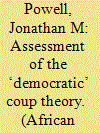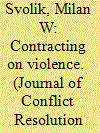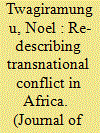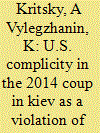| Srl | Item |
| 1 |
ID:
134340


|
|
|
|
|
| Summary/Abstract |
The Egyptian military's unconstitutional removal of President Mohamed Morsi has reignited a debate regarding the theory of the ‘democratic coup’. Though coups are almost invariably condemned, many political observers and a few scholars have recently argued that coups can act as catalysts for democratisation. This paper empirically assesses the democratic coup hypothesis for Africa. Multivariate analyses from 1952 to 2012 suggest that coups statistically improve a country's democratisation prospects. Extensions of the model show that coups appear to be likely precursors for democratisation in staunchly authoritarian regimes and have become less likely to end democracy over time, and that their positive influence has strengthened since the end of the Cold War. As of 2012, countries that have experienced a recent coup are expected to be four times more likely to witness a democratic transition than those that have remained coup-free.
|
|
|
|
|
|
|
|
|
|
|
|
|
|
|
|
| 2 |
ID:
124138


|
|
|
|
|
| Publication |
2013.
|
| Summary/Abstract |
Why does the military intervene in the politics of some countries but remain under firm civilian control in others? The paper argues that the origins of military intervention in politics lie in a fundamental moral hazard problem associated with authoritarian repression. Dictators must deter those who are excluded from power from challenging them. When underlying, polity-wide conflict results in threats to the regime that take the particular form of mass, organized, and potentially violent opposition, the military is the only force capable of defeating them. The military exploits this pivotal position by demanding greater institutional autonomy as well as a say in policy, and it threatens to intervene if the civilian leadership departs from a subsequent compromise on these issues. A game-theoretic analysis of such contracting on violence implies that the likelihood of military intervention in politics should be greatest at intermediate levels of mass threats. Original, large-N data on military intervention support these claims.
|
|
|
|
|
|
|
|
|
|
|
|
|
|
|
|
| 3 |
ID:
170204


|
|
|
|
|
| Summary/Abstract |
This paper discusses the principal findings of a new integrated dataset of transnational armed conflict in Africa. Existing Africa conflict datasets have systematically under-represented the extent of cross-border state support to belligerent parties in internal armed conflicts as well as the number of incidents of covert cross-border armed intervention and incidents of using armed force to threaten a neighbouring state. Based on the method of ‘redescribing’ datapoints in existing datasets, notably the Uppsala Conflict Data Project, the Transnational Conflict in Africa (TCA) data include numerous missing incidents of transnational armed conflict and reclassify many more. The data indicate that (i) trans-nationality is a major feature of armed conflict in Africa, (ii) most so-called ‘civil wars’ are internationalised and (iii) the dominant definitions of ‘interstate conflict’ and ‘civil war’ are too narrow to capture the particularities of Africa's wars. While conventional interstate war remains rare, interstate rivalry using military means is common. The dataset opens up a research agenda for studying the drivers, patterns and instruments of African interstate rivalries. These findings have important implications for conflict prevention, management and resolution policies.
|
|
|
|
|
|
|
|
|
|
|
|
|
|
|
|
| 4 |
ID:
169508


|
|
|
|
|
| Summary/Abstract |
FIVE YEARS AGO, a coup d'etat took place in Kiev. Following demonstrations and arson attacks, a mob seized several government institutions, including the administration building and residence of the constitutionally elected president of Ukraine, Viktor Yanukovich. Some members of the Ukrainian president's security detail who were protecting his residence from illegal seizure were wounded and killed.1 Alexander Turchinov, one of the coup leaders, began serving as the president of Ukraine even though no Ukrainian presidential election had been held.
|
|
|
|
|
|
|
|
|
|
|
|
|
|
|
|